Seeking transformative experiences in many ways defines the “American Dream” of today. Though things like home ownership and a nuclear family are certainly still #goals for some, for many others the desire to experience new places, new people, and “interesting” activities is perceived as central to defining a fulfilled or successful life. This is amplified by a growing imperative to document experiences on social media, and can come with well-intentioned but harmful expectations around interactions, especially with nonhuman animals both in the wild and in captivity. Thankfully, booking platforms like Airbnb are taking this seriously, building a new animal welfare policy (written in collaboration with World Animal Protection) embedded in their Animal Experiences.
Increasingly, there is a yearning to connect to wildlife, wild places and other animals. And in some instances, there is valid necessity as many conservation and/or rescue/rehabilitation efforts are dependent upon wildlife or nature tourism to exist, employing many local people and offering a sustainable and educational option away from damaging activities. This, however, creates a demand with mounting pressure – many facilities take this as license to use and abuse animals and/or ignore safety protocols for distance, frequency of interaction, and so on. As a response, Airbnb (in collaboration with World Animal Protection) has moved away from traditional animal experiences, including unaccredited zoos, circuses, marine mammal parks. Instead, “these 1000+ experiences are hosted by animals and the humans who champion them.”
The Problem with Animal Tourism
The majority of booking sites are driving tourism to substandard animal interactions. By highlighting specific destinations, including unaccredited zoos and roadside attractions as you scroll through ‘things to do’ in X locale, they endorse these practices. For the standard traveler, this digital promotion is a misleading sign of standards; the idea that, “Surely if this travel platform is showcasing them, they must be a quality facility.” This is fueling cruel and inappropriate treatment, some horrific examples of which include the heinous conditions of “tiger farms”, recently exposed as drugging, killing and generally mistreating animals. Others of which include using great apes as props, dressing them up, and isolating them from essential socialization with others of their species. The list goes on and is only further reinforced by the unfortunate amount of social media engagement videos of these interactions receive.
In response to recent imagery and footage of facilities with sub-par practices (noting a particular video of a captive chimpanzee), Dr. Jane Goodall recently wrote, “And I hope and urge the people who have chimpanzees in their care will cease use of him in this way and join those of us who are working to end the cruel treatment of chimpanzees in entertainment.”
The Airbnb Animal Experiences category serves as an answer, providing an important outlet for people to connect to other animals and the natural world, without putting either in further peril. The company co-authored this industry-leading animal welfare policy “that all Airbnb hosts must comply with in order to be listed on the platform.” The company’s highly specific policy vets all experiences through this welfare criteria, both raising the bar and rewarding those facilities and hosts for conforming to these standards.
A Standard to Stand On
As we encourage recognition of our connection to all living beings and the importance of accepting our responsibility to protect fellow animals and the planet, it is vital that we find humane ways to grow that connection. The work of this platform is “designed to offer a much-needed counterpoint to the way that people currently interact with animals when they travel. These transformative activities will take place in the natural world, on farms, or in domestic spaces – i.e., outside of tourist settings, which are notorious for ethical concerns.” Hopefully, this will serve as a model for other platforms and companies to follow suit, signaling a turning point in how we actualize our values around the treatment of nonhuman animals, people and the environment we share.

The Jane Goodall Institute is a global community conservation organization that advances the vision and work of Dr. Jane Goodall. By protecting chimpanzees and inspiring people to conserve the natural world we all share, we improve the lives of people, animals and the environment. Everything is connected—everyone can make a difference.









